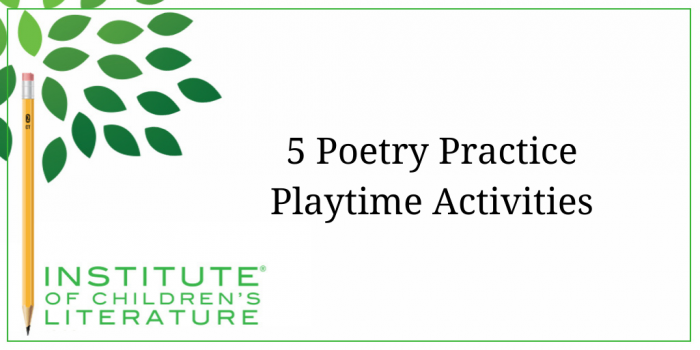1000 N. West Street #1200, Wilmington, DE 19801
© 2024 Direct Learning Systems, Inc. All rights reserved.

We teach our students how to write and get published!
View our Course Catalog >
Poetry, like any art form, is improved with practice. The more you do it, the better you’ll become at it. But there is something very special about poetry: the more you practice writing poetry, the more you become better at all your writing. Plus, as a short art form poetry is especially well suited to exercises and practice because you can warm up your writing in a fairly short amount of time through some poetry writing activities. So here are a handful to get you started.
Make a Study. Painters make studies of objects and places to get better at painting them. Poets can do the same. Look in your fruit bowl and really study an apple. What is it like in color, in shape, in weight, in taste, in smell? Spend some time with it and look for connections that come up: your first time apple picking or your first attempt to bake an apple pie. Somewhere inside the study lies a poem. It’s up to you to find it.
Put yourself in a place to be surprised. If you’re a homebody (or are self-isolating in this Covid-19 era) then it can be easy to become rather static in your poetry options because you don’t give yourself a chance to be surprised by something new or unexpected. I find even something as small as a walk around the block can show me new unexpected things. This is especially helpful during a change of season when the signs of the new season are just beginning to emerge. I find something especially inspiring about that. The key to using these opportunities is to pay attention to even small things, which includes the people around you. Look, listen, extend your senses, and then when you have a chance, make a list of all the things you noticed: “the air smelled like damp earth,” “the house on the corner looked so still and shuttered, but I heard barking coming from inside,” “a shadow fell on me like gloom and I looked up to see a cloud sailing along, so large as to block out the sun.” Writing down (preferably long-hand) the things you saw will push you to think deeply about them, and you may find a poem lurking in there.
Begin with “I remember…” One good thing about poetry that grows from memory is that time smooths the edges of pain, giving us firmer ground to look at things. So I can remember the day someone knocked on my door, and I opened it to find a friend holding an enormous puppy that she thrust into my arms. For a long time, that memory always had a painful tag-along, the memory of losing that dog, but time has softened that enough to look at the good without being swamped by the bad. Poetry about painful memories that still swamp us with grief is difficult because there’s no way to get inside the memory properly without being overcome. Of course, some memories are pure joy and don’t come with anything painful, like our first taste of homemade ice cream or the first time we saw a butterfly crawl out of its chrysalis.
Make a deck of Poet’s cards. Flashcards can be great fun. On one side write an object or animal or maybe a category of person (grandmother, mom, bus driver, king, etc.). Build up the cards as you have time until you have a nice fat bundle. Then when you need some poetry practice, trying dealing out a pair of cards and ask yourself “how is this card like this card?” How is a king like a pear? How is a kitten like a scarf? How is a raven like a writing desk? By coming up with novel ways two seemingly unlike items are alike, you’ll expand your ways of thinking which is hugely useful in a poet.
Create a file box of favorite short poems by other poets. Then when the box is nice and full, pick out a poem every now and then and use it as a mentor for your own poem. Your poem might be inspired by the same general subject (changing seasons, for instance) or the same theme (like trust, or courage) or perhaps by the same meter (I often use mentor poetry to help me learn to better hear meter as I write.)
Whatever poetry writing exercise you choose (and you can find many more in a Google search), do consider adding an exercise to your daily writing. Whether your goal is to publish poetry or not, the writing of poetry will make you a better writer. And that’s valuable to us all.
1000 N. West Street #1200, Wilmington, DE 19801
© 2024 Direct Learning Systems, Inc. All rights reserved.
1000 N. West Street #1200, Wilmington, DE 19801
© 2024 Direct Learning Systems, Inc. All rights reserved.
1000 N. West Street #1200, Wilmington, DE 19801
© 2024 Direct Learning Systems, Inc. All rights reserved.
3 Comments